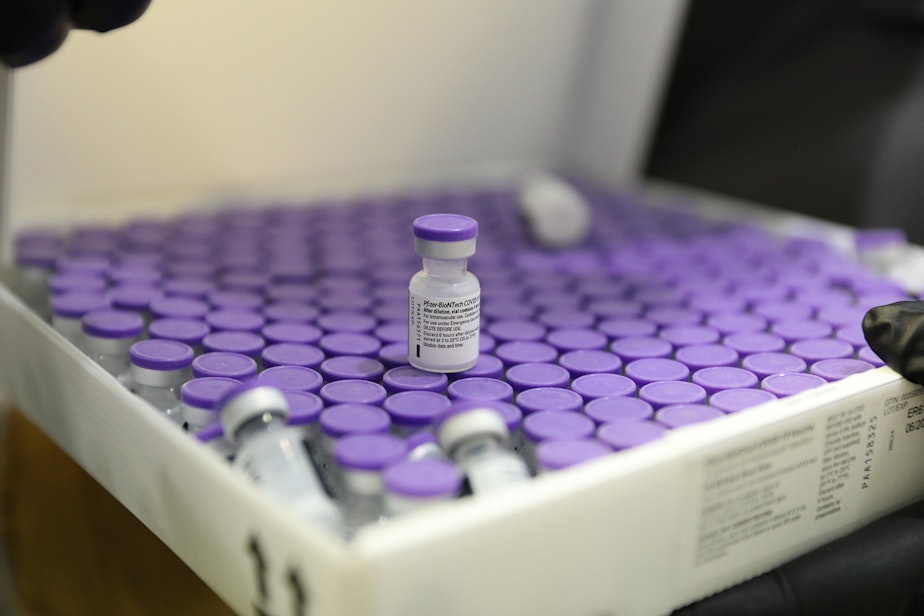The big question about Covid vaccines that this UW study aims to answer

Researchers are recruiting college students at the University of Washington, and around the country, to help answer some big questions about Covid-19 vaccines.
Available Covid-19 vaccines appear highly effective in preventing serious illness and death. What isn’t known for sure is to what degree vaccinated people can still get a mild or asymptomatic case, and how likely they are to then spread that infection to others.
“What we don’t yet know is whether my getting vaccinated benefits you,” said Holly Janes, a biostatistician at the Fred Hutchinson Cancer Research Center.
Janes helped design a study to answer that very question.
The Prevent Covid U study will track roughly 12,000 participants, aged 18 – 26 years old, from college campuses around the United States. Half of the participants will receive the Moderna vaccine immediately, the other half will receive it four months later.
Participants will commit to daily nasal swabs, regular testing, giving blood samples, and keeping an e-diary. The regularity of testing will allow researchers to pinpoint any infections in real time, even if the person has no symptoms or low levels of the coronavirus.
People who choose to participate will be compensated, with amounts varying from city to city.
The study will also follow close contacts of participants – family members, roommates, partners, co-workers etc. – so if someone does get sick, researchers can determine whether they’ve infected others around them.
The results will likely have huge implications for how, and if, people are able to get back to activities that have been out of reach for the past year, or whether precautions like masking and socially distancing need to linger for an extended period of time.
Dr. Helen Chu studies infectious diseases at the University of Washington and is involved with the study. She is helping to recruit UW students. She said if the vaccine doesn’t prevent people from spreading the virus, things like masking will need to continue around unvaccinated individuals.
“But if we find that the vaccine has the ability to prevent carriage of the virus and transmission to others, even if you have no symptoms, then that allows us in many ways to feel much safer about returning back to the way things were,” Chu said.
The results will also likely affect policy around vaccine rollouts. If it’s shown to reduce or prevent transmission, groups with high transmission rates would likely be prioritized.
Solely focused on the Moderna vaccine, results will probably be more widely applicable, according to researchers.
“The Moderna vaccine is an mRNA vaccine, so I think the extrapolation of this study to other mRNA vaccines, like the Pfizer vaccine, will be probably pretty reasonable,” said study designer Holly Janes.
Janes said extrapolating to vaccines that use other technology may be a bit more of a stretch, but they’ll still gain valuable information that will inform future conversations.
The study, funded by the National Institutes of Allergy and Infectious Disease, is taking place on 21 college campuses around the country and will draw from diverse geographies and demographic groups. It will also span areas with new variants of the virus to try to capture any differences in vaccine efficacy.
Recruitment and vaccination of people randomly selected to receive the shots immediately has already begun.
“Really what you’re trying to do with any type of study is to find cases,” University of Washington researcher Dr. Helen Chu said. “So we’re looking for places where there are going to be a lot of cases of coronavirus, and that is college campuses."
Colleges around the country, including several in Washington state, have seen outbreaks on their campuses. Young, healthy individuals are at high risk for getting Covid-19, but much lower risk of developing serious symptoms. Many students also live in congregate settings and many campuses have rigorous testing programs that will be utilized during the study.
Researchers were hoping the promise of a vaccine during the trial would be a selling point as they try to recruit participants, but as vaccine eligibility timelines accelerate they’re banking on a desire to contribute to science as they try to get students involved. The front page of the study website states: “Your plans are all cancelled anyway, might as well sign up and be a part of history.”
Researchers hope to have data by the end of the summer and results that could inform policy as students return in the fall of 2021.




